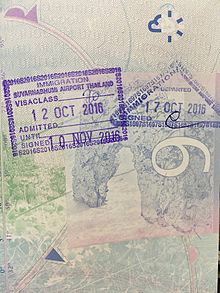ผู้ใช้:Wutkh/ทดลองเขียน
 | นี่คือหน้าทดลองเขียนของ Wutkh หน้าทดลองเขียนเป็นหน้าย่อยของหน้าผู้ใช้ ซึ่งผู้ใช้มีไว้ทดลองเขียนหรือไว้พัฒนาหน้าต่าง ๆ แต่นี่ไม่ใช่หน้าบทความสารานุกรม ทดลองเขียนได้ที่นี่ หน้าทดลองเขียนอื่น ๆ: หน้าทดลองเขียนหลัก |

ผู้เดินทางเข้ามาในประเทศไทยจะต้องถือวีซ่าที่ออกโดยคณะผู้แทนทางการทูตไทย เว้นแต่เข้าข่ายได้รับยกเว้นวีซ่าหรือเป็นบุคคลที่ถือหนังสือเดินทางของประเทศที่กำหนดให้สามารถขอรับวีซ่าเมื่อเดินทางมาถึงได้
ตั้งแต่พฤษภาคม พ.ศ. 2557 การรีเซ็ตเวลาสำหรับการยกเว้นวีซ่าโดยการเดินทางออกไปยังประเทศเพื่อนบ้านแล้วกลับเข้ามาอีก ไม่สามารถกระทำได้อีกต่อไป ดังนี้หากคนชาติอื่นประสงค์จะอยู่ต่อเกินเวลายกเว้นวีซ่าจะต้องขอวีซ่าให้เรียบร้อย อย่างไรก็ดีในเดือนสิงหาคมปีเดียวกัน นายกรัฐมนตรีขอให้ตำรวจตรวจคนเข้าเมืองยืดหยุ่นการบังคับใช้กฎหมายในส่วนนี้เนื่องจากการบังคับใช้กฎหมายเข้มงวดจะมีผลกระทบต่อโรงเรียนและอุตสาหกรรมท่องเที่ยว
บทความนี้ไม่มีการอ้างอิงจากแหล่งที่มาใด |
ในปี พ.ศ. 2563 มีการระงับวีซ่าของพลเมืองบางประเทศเป็นการชั่วคราว เนื่องจากสถานการณ์การระบาดทั่วของโคโรนาไวรัส พ.ศ. 2562–2563 ตั้งแต่วันที่ 13 มีนาคม - 30 กันยายน 2563[1]
แผนที่นโยบายการขอรับลงตราของผู้เดินทางเข้าประเทศไทย
[แก้]
กลุ่มประเทศยกเว้นวีซ่า 90 วัน
[แก้]รัฐบาลของประเทศดังต่อไปนี้มีข้อตกลงทวิภาคียกเว้นวีซ่ากับประเทศไทย และคนชาติของทั้งสองประเทศสามารถอาศัยในประเทศคู่ภาคีโดยไม่ต้องมีวีซ่าสูงสุด 90 วัน
สำหรับหนังสือเดินทางทุกประเภท
[แก้]สำหรับหนังสือเดินทางทูตและราชการ
[แก้]ส่วนนี้รอเพิ่มเติมข้อมูล คุณสามารถช่วยเพิ่มข้อมูลส่วนนี้ได้ |
ยกเว้นวีซ่า 60 วัน
[แก้]
ผู้ถือหนังสือเดินทางประเทศต่อไปนี้จะได้รับการยกเว้นวีซ่าเมื่อเดินทางเข้าประเทศไทยเป็นระยะเวลาสูงสุด 60 วัน[3]
† คนชาติของประเทศที่ประเทศไทยมีข้อตกลงทวิภาคีเกี่ยวกับการยกเว้นวีซ่าด้วย จะได้รับยกเว้นวีซ่าเป็นเวลา 30 วัน
‡ คนชาติของประเทศในกลุ่ม G7 (สหรัฐอเมริกา สหราชอาณาจักร ฝรั่งเศส เยอรมนี อิตาลี แคนาดาและญี่ปุ่น) จะได้รับยกเว้นวีซ่าเป็นเวลาสูงสุด 30 วันเมื่อผ่านแดนทางบก ตั้งแต่ 1 พฤศจิกายน 2556 เป็นต้นไป
สำหรับหนังสือเดินทางทุกประเภท
[แก้]
--- |
สำหรับหนังสือเดินทางทูตและราชการ
[แก้]ส่วนนี้รอเพิ่มเติมข้อมูล คุณสามารถช่วยเพิ่มข้อมูลส่วนนี้ได้ |
ตั้งแต่วันที่ 29 สิงหาคม 2557 คนชาติของประเทศที่ได้รับการยกเว้นวีซ่าเกือบทั้งหมดสามารถขอพำนักต่อได้อีก 30 วัน
หมายเหตุ: หนังสือเดินทางทุกประเภทในที่นี้หมายถึงหนังสือเดินทางประเภททูต ราชการ และธรรมดา
ยกเว้นวีซ่า 14 วัน
[แก้]
วีซ่าเมื่อเดินทางมาถึง
[แก้]| ภาพจากแหล่งข้อมูลภายนอก | |
|---|---|
คนชาติของประเทศต่อไปนี้สามารถขอวีซ่าเมื่อเดินทางมาถึงได้ ณ จุดผ่านแดนทางอากาศหรือทางบกที่สำคัญ โดยมีค่าใช้จ่าย 1,000 บาท และสามารถพำนักได้ 15 วัน ไม่สามารถต่ออายุได้ นอกจากนี้ผู้ถือหนังสือเดินทางจีนหรือหนังสือเดินทางไต้หวันจะได้รับยกเว้นค่าธรรมเนียมวีซ่าเมื่อเดินทางเข้าประเทศตั้งแต่ 9 สิงหาคมถึง 8 พฤศจิกายน 2557[5]
|
|
|
ช่องทางอนุญาตของด่านตรวจคนเข้าเมืองที่ผู้ร้องสามารถขอรับการตรวจลงตรา 42 แห่ง
[แก้]- ด่านตรวจคนเข้าเมืองท่าอากาศยานสุวรรณภูมิ
- ด่านตรวจคนเข้าเมืองท่าอากาศยานดอนเมือง
- ด่านตรวจคนเข้าเมืองท่าอากาศยานเชียงใหม่
- ด่านตรวจคนเข้าเมืองท่าอากาศยานภูเก็ต
- ด่านตรวจคนเข้าเมืองท่าอากาศยานหาดใหญ่
- ด่านตรวจคนเข้าเมืองท่าอากาศยานอู่ตะเภา
- ด่านตรวจคนเข้าเมืองแม่สาย
- ด่านตรวจคนเข้าเมืองเชียงแสน
- ด่านตรวจคนเข้าเมืองเชียงของ
- ด่านตรวจคนเข้าเมืองเบตง
- ด่านตรวจคนเข้าเมืองสะเดา
- ด่านตรวจคนเข้าเมืองสมุย ณ บริเวณเขตท่าอากาศยานเกาะสมุย
- ด่านตรวจคนเข้าเมืองตาก ณ บริเวณเขตสนามบินสุโขทัย
- ด่านตรวจคนเข้าเมืองท่าเรือกรุงเทพ
- ด่านตรวจคนเข้าเมืองศรีราชา ณ ทำเลจอดเรือในอ่าวอุดม และบริเวณเขตท่าเรือแหลมฉบัง
- ด่านตรวจคนเข้าเมืองมาบดาพุด ณ บริเวณเขตท่าเรือมาบดาพุด และทำเลจอดเรือในอ่าวหน้าเมืองระยอง
- ด่านตรวจคนเข้าเมืองหนองคาย ณ เส้นทางคมนาคมทางบกจากพรมแดนถึงที่ตั้งด่านตรวจคนเข้าเมืองหนองคาย
- ด่านตรวจคนเข้าเมืองสมุย ณ ทำเลจอดเรือบริเวณอ่าวหน้าทอน
- ด่านตรวจคนเข้าเมืองภูเก็ต ณ ทำเลจอดเรือบริเวณอ่าวมะขาม และทำเลจอดเรือบริเวณอ่าวฉลอง
- ด่านตรวจคนเข้าเมืองสตูล ณ บริเวณเขตท่าเรือด่านศุลกากรตำมะลัง และบริเวณเขตท่าเรือเจ้ะปิลัง
- ด่านตรวจคนเข้าเมืองกระบี่ ณ บริเวณเขตท่าเรือน้ำลึกกระบี่, บริเวณเขตท่าเรือเจ้าฟ้า บริเวณเขตท่าเรือเกาะลันดา และบริเวณเขตสนามบินกระบี่
- ด่านตรวจคนเข้าเมืองท่าเรือสงขลา ณ บริเวณเขตท่าเรือน้ำลึกสงขลา และบริเวณเขตท่าเรือเดินเรือไทย
- ด่านตรวจคนเข้าเมืองท่าอากาศยานเชียงราย
- ด่านตรวจคนเข้าเมืองท่าอากาศยานสุราษฎร์ธานี
- ด่านตรวจคนเข้าเมืองพัทยา ณ บริเวณเขตท่าเรือสัตหีบ
- ด่านตรวจคนเข้าเมืองคลองใหญ่
- ด่านตรวจคนเข้าเมืองโป่งน้ำร้อน
- ด่านตรวจคนเข้าเมืองอรัญประเทศ
- ด่านตรวจคนเข้าเมืองมุกดาหาร
- ด่านตรวจคนเข้าเมืองตาก ณ เส้นทางคมนาคมทางบกจากพรมแดนถึงที่ตั้งด่านตรวจคนเข้าเมืองตาก
- ด่านตรวจคนเข้าเมืองปาดังเบซาร์
- ด่านตรวจคนเข้าเมืองสุไหง โก-ลก
- ด่านตรวจคนเข้าเมืองหนองคาย ณ บริเวณเขตท่าเรือตามชายฝั่งแม่น้ำโขง
- ด่านตรวจคนเข้าเมืองบึงกาฬ
- ด่านตรวจคนเข้าเมืองพิบูลมังสาหาร ณ เส้นทางคมนาคมทางบกจากพรมแดนถึงที่ตั้งด่านตรวจคนเข้าเมืองพิบูลมังสาหาร
- ด่านตรวจคนเข้าเมืองท่าลี่
- ด่านตรวจคนเข้าเมืองนครพนม ณ เส้นทางคมนาคมทางบกจากพรมแดนถึงที่ตั้งด่านตรวจคนเข้าเมืองนครพนม
- ด่านตรวจคนเข้าเมืองน่าน ณ เส้นทางคมนาคมทางบกจากพรมแดนถึงที่ตั้งด่านตรวจคนเข้าเมืองน่าน
- ด่านตรวจคนเข้าเมืองบ้านประกอบ
- ด่านตรวจคนเข้าเมืองควนโดน
- ด่านตรวจคนเข้าเมืองตากใบ
- ด่านตรวจคนเข้าเมืองบูเก๊ะตา
ประเภทของวีซ่า
[แก้]ประเภทวีซ่าทั่วไป
[แก้]- มารยาท: เมื่อมีการร้องขออย่างเป็นทางการสถานเอกอัครราชทูตไทย อาจให้วีซ่ามารยาท / ไม่รู้ไม่สัญจรนักการทูต / เจ้าหน้าที่สหประชาชาติ / อื่น ๆ ที่มีความประสงค์ที่จะเข้ามาในราชอาณาจักรในการปฏิบัติหน้าที่อย่างเป็นทางการและ / หรือวัตถุประสงค์อื่น ๆ
- ถิ่นที่อยู่ถาวร: ที่จะมีคุณสมบัติสำหรับการขอวีซ่านี้คุณต้องมีอยู่ในประเทศไทยเป็นเวลาติดต่อกัน 3 กับวีซ่าหนึ่งปีนามสกุล ถ้าแต่งงานกับคนไทยเป็นเวลา 5 ปีหนึ่งจะต้องมีรายได้ 30,000 บาท / เดือน หากเดียวรายได้ต่อเดือนของคุณจะต้องขั้นต่ำ 80,000 บาท
- ท่องเที่ยว: ถ้าแต่ละคนมีความประสงค์ที่จะยังคงอยู่ในประเทศไทยมานานกว่า 30 วันเขา / เธออาจต้องการที่จะได้รับวีซ่าท่องเที่ยวที่สถานเอกอัครราชทูตหรือสถานกงสุลไทยก่อนที่จะเดินทางมาถึงในประเทศไทยวีซ่าท่องเที่ยวต้องใช้ภายในวันที่ถูกต้องที่ขึ้นอยู่กับจำนวนของรายการซื้อและช่วยให้การสำรองห้องพักเริ่มต้นของ 60 วัน หลังจากการมาถึงในประเทศไทยวีซ่าท่องเที่ยวหรือวีซ่าเข้าประเทศได้รับการยกเว้นอาจจะขยายครั้งสำหรับอีก 30 วันตามคำสั่งสำนักงานตรวจคนเข้าเมือง 327/2557 มีค่า 1,900 บาทสำหรับแต่ละส่วนขยายเป็น
- การขนส่ง: ประเภทของวีซ่านี้จะออกให้แก่ผู้สมัครที่มีความประสงค์ที่จะเข้าสู่ราชอาณาจักรเพื่อวัตถุประสงค์ดังต่อไปนี้ที่จะเดินทางไปในระหว่างการขนส่งผ่านมาในราชอาณาจักรเพื่อดำเนินการต่อไปยังประเทศปลายทางหรือป้อน / ประเทศของตน (หมวดหมู่ "TS "); บุคคลที่อยู่ในความดูแลของหรือลูกเรือของยานพาหนะที่จะมาถึงท่าเรือ, สถานีหรือพื้นที่ในราชอาณาจักร (หมวดหมู่ "C")
ประเภทวีซ่าผู้อพยพ
[แก้]- ประเภท B: ในการดำเนินธุรกิจ ทำงาน เข้าร่วมการประชุมทางธุรกิจ สอนโรงเรียน เข้าร่วมดำน้ำ, มวยไทยและหลักสูตรนวด
- ประเภท D: วีซ่าทางการทูต
- ประเภท ED เพื่อศึกษา; ที่จะมาในการท่องเที่ยวการศึกษาการทำงานหรือการท่องเที่ยวสังเกต; การเข้าร่วมโครงการหรืองานสัมมนา; ที่จะเข้าร่วมการประชุมหรือการฝึกอบรมหลักสูตร; เพื่อศึกษาความเป็นพระสงฆ์ต่างประเทศ
- ประเภท EX: ในการทำงานที่มีทักษะหรือการทำงานเป็นผู้เชี่ยวชาญหรือผู้เชี่ยวชาญ
- ประเภท F: การปฏิบัติหน้าที่อย่างเป็นทางการเช่นการออกกำลังกายทหารหรือหน่วยงานของรัฐที่ได้รับมอบหมาย
- ประเภท IB: การลงทุนหรือดำเนินกิจกรรมอื่น ๆ ที่เกี่ยวข้องกับการลงทุนภายใต้บทบัญญัติของกฎหมายที่จัดตั้งขึ้นในการส่งเสริมการลงทุน
- ประเภท IM: การลงทุนด้วยความเห็นชอบของกระทรวงไทยและหน่วยงานภาครัฐที่เกี่ยวข้อง
- ประเภท M: ในการทำงานเป็นผู้ผลิตฟิล์ม, นักข่าวหรือผู้สื่อข่าวได้รับอนุญาตจากกระทรวงการต่างประเทศ
- ประเภท O: ไปเยี่ยมครอบครัว; ในการปฏิบัติหน้าที่สำหรับรัฐวิสาหกิจหรือองค์กรสวัสดิการสังคม (เอ็นจีโอ); ได้รับการรักษาทางการแพทย์ ที่จะเป็นโค้ชกีฬาตามที่กำหนดโดยรัฐบาลไทย ที่จะเป็นผู้เข้าประกวด; เพื่อเป็นพยานในกระบวนการยุติธรรม
- ประเภท O-A: วีซ่าเกษียณอายุ
- ประเภท R: ในการดำเนินงานเผยแผ่ศาสนาหรือกิจกรรมทางศาสนาอื่น ๆ ด้วยความเห็นชอบของกระทรวงไทยหรือหน่วยงานภาครัฐที่เกี่ยวข้อง
- ประเภท RS: ที่จะดำเนินการวิจัยทางวิทยาศาสตร์หรือการฝึกอบรมหรือการเรียนการสอนในสถาบันการวิจัย
- ประเภท S: การมีส่วนร่วมในการได้รับการยอมรับอย่างเป็นทางการในการแข่งขันกีฬา
ดูเพิ่ม
[แก้]อ้างอิง
[แก้]- ↑ รมว.มหาดไทย ออกคำสั่ง ระงับอนุญาตให้คนต่างด้าวบางจำพวกเข้าประเทศชั่วคราว
- ↑ "List of Countries and Territories Which Have Bilateral Agreement on Visa Exemption for Ordinary passports with Thailand" (PDF). Department of Consular Affairs. สืบค้นเมื่อ 20 July 2024.
- ↑ กระทรวงมหาดไทย (2024-07-15). ประกาศกระทรวงมหาดไทย เรื่อง กำหนดรายชื่อประเทศและดินแดนที่ผู้ถือหนังสือเดินทางหรือเอกสารใช้แทนหนังสือเดินทางซึ่งเข้ามาในราชอาณาจักรเป็นการชั่วคราวเพื่อการท่องเที่ยว ทำงานหรือการติดต่อธุรกิจระยะสั้น ได้รับการยกเว้นการตรวจลงตรา และให้อยู่ในราชอาณาจักรได้ไม่เกินหกสิบวัน เป็นกรณีพิเศษ (PDF). สำนักพิมพ์ราชกิจจานุเบกษา. pp. 1--6. สืบค้นเมื่อ 2024-07-20.
- ↑ Estonian tourists can visit Thailand visa-free
- ↑ "ตรวจลงตรา (VISA) : รายชื่อประเทศที่สามารถขอรับการตรวจลงตรา ณ ช่องทางอนุญาตของด่านตรวจคนเข้าเมือง (VISA ON ARRIVAL) และพำนักอยู่ในราชอาณาจักรได้ไม่เกิน 15 วัน". คลังข้อมูลเก่าเก็บจากแหล่งเดิมเมื่อ 2015-04-05. สืบค้นเมื่อ 2014-11-30.
